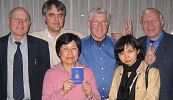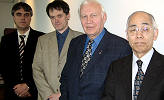Summary
The Icelandic Althingi (national parliament) received a document, which we
reproduce below, transcribing the discussions that took place during a meeting
between Mizuho Fukushima, Leader of the Social Democratic Party of Japan, and
Ministry of Justice Immigration Bureau, which is responsible for the fate of
the detainee Fischer. In this meeting it was very clearly stated that
At the end of the session, as documented in the transcript below, Fukushima
explicitly confirms that everything hinges on citizenship:
Mizuho Fukushima immediately wrote a letter (reproduced below) to the Icelandic
Althingi, enclosing the transcript of the meeting. Based on this the Icelandic
Parliament Committee, which deals with citizenships, decided unanimously on
Friday evening to recommend that RJF will be granted an Icelandic citizenship.
It is expected that a special bill will be passed by Althingi on Monday, March
21st, granting Fischer citizenship. This means that Bobby Fischer could next
week be released from detention in Japan and could travel to Iceland and freely
around the world.
A new Icelandic delegation will travel to Japan next week to escort him to
Iceland. Iceland has an extradition treaty with the US.
Documents provided below
News links
In the meantime the The RJF Committee has handed the following letter to the
Japanese Ambassador to Iceland:
A LETTER OF PROTEST
to the Japanese Authorities
Reykjavík, 15th of March 2005
HE Ms Fumiko Saiga
Japanese Ambassador to Iceland
c/o Chargé d´Affaires a.i: Mr. Hioshi Abe
Laugarvegur 182,
105 Reykjavík.
As we refer to our letter to your Embassy of the 15th of December 2004 on
the fate of Mr. Robert James Fischer, we now feel ourselves obliged to express
our deepest dismay and sorrow of The Japanese Authorities grotesque violation
of his human rights and of international law. Referring to the conversation
we had with Mr. Abe that day, where your embassy convinced us that this was
nothing but a simple matter of an invalid passport, we must point out the following:
Mr. Fischer is now being held prisoner in Japan for more than 9 months
on no grounds whatsoever, despite the fact that he has an valid Icelandic passport,
a flight ticket booked out of Japan and an Icelandic residency. His continued
detention in Japan constitutes a gross violation of human rights.
As we protest the stongest possible terms against your handling of this matter,
we request an immediate release of Mr. Robert James Fischer.
Respectfully
On behalf of
The RJF Committee – Iceland.
Einar S. Einarsson
Helgi Olafsson
Gardar Sverrisson

Members of the FJF Committee G. Sverrisson; GM H. Olafsson; E.S. Einarsson,
with the Japanese Chargé d´Affaires Mr. Hioshi Abe, at the Japanese
Embassy
Letter from the Leader of the Japanese Social Democratic Party
From Mizuho Fukushima
Leader of the Social Democratic Party
Member of House of Councillors
March 18, 2005
Dear Members of the Icelandic Althingi,
Respectful greetings from Japan.
I am sending you this message in order to try to resolve the issue of the
extended detention of Mr. Robert "Bobby" James Fischer in Japan,
met with the head of our Justice Ministry's Immigration Bureau, Mr. Masaharu
Miura, on Wednesday, March 16.
Please find attached below the certified text of our discussion, which I
have carefully checked and can verify as being a true transcript of our discussion.
My consultation with Mr. Miura in my capacity as a member of the House of Councilors
is a privilege of my office in the parliament and you may report the contents
of our discussion freely.
Sincerely extending my best regards,
Mizuho Fukushima
Transcript of meeting on Wednesday, March 16, 2005
Questions and answers on the case of former world chess champion,
Bobby Fischer
Representation to:
Masaharu Miura, Bureau Chief, Ministry of Justice Immigration Bureau,
Ministry of Justice, 9th Floor, Tokyo, Japan
Representation by:
Mizuho Fukushima, House of Councilors Member
Leader of the Social Democratic Party
Mizuho Fukushima: With regard to the deportation of Bobby
Fischer back to America, this time another country, Iceland, has come forward
and offered to take him in. He has his ticket; therefore surely he must be
allowed to leave Japan. The fact that he isn’t being allowed to is incomprehensible,
and I believe this is sort of thing is unprecedented. I’ve come today
to implore you to allow him to leave Japan.
Masaharu Miura: Permitting deportation to a third country
is a most exceptional step. Article 53, Subsection 2 of the Immigration Bureau
code clearly states the exceptional nature of such a thing, declaring that
“in cases where it is not possible to deport persons to the previously
stated country…”. In this case, Bobby Fischer has American nationality,
and there is no obstacle to his being taken in by the US. In other words, he
can only be deported to the US. In the case of a Mandate Refugee, only in cases
where it is deemed inappropriate or unsuitable to return persons to their home
country is deportation elsewhere permitted.
Mizuho Fukushima: In that case [of Kazan Kiran, a Kurdish
Turk], why did you return him to his home country?
Masaharu Miura: In that case, the courts decided that is
what would happen, so it couldn’t be helped. Only in cases where Article
53, Subsection 3 is nonviable do we look at Subsection 2. We are really talking
about war-torn nations when we refer to countries to which it would be unsuitable
for the deported person to return. That doesn’t apply here [in Bobby
Fischer’s case].
Mizuho Fukushima: Have there been cases in the past where
the deported person has expressed his desire to be sent to a country that is
not his home country, but a country that has given its permission and to which
the deported person has been allowed to go?
Masaharu Miura: There was a similar question asked yesterday
in parliament. I can’t answer right away, but there have been cases in
which countries have given their permission and persons have been confirmed
as Mandate Refugees. There have also been cases in which a country has accepted
a refugee midway through his/her trial and they have bonded with [their] family.
However, these cases have been due to exceptional circumstances, and in these
cases civil law has been correctly applied. In Bobby Fischer’s case,
however, we only have Fischer saying he doesn’t want to go back to America,
despite the fact that America is peerless as a democratic country, so in this
case the only thing to do is have Fischer return to the US.
Mizuho Fukushima: So, it is the case that you can be flexible
to a certain extent with your application of Article 53, and regarding where
to send Fischer, if another country is offering to take him in. That being
the case, why can’t he go?
Masaharu Miura: For example, if the country in question is
offering to take him in while recognizing Fischer as one of their own citizens,
it falls within the scope of Article 53, Subsection 1, and of course we would
allow him to go. However, in this case, what the Iceland government offering
is ultimately only a “foreign-citizen use passport”, it does not
come under the scope of that article.
Mizuho Fukushima: However, right now no progress is being
made. Why are things just hanging suspended in midair?
Masaharu Miura: Because the trial concerning the dismissal
of Fischer’s deportation order is midway through.
Mizuho Fukushima: Setting aside for the moment the question
of whether he qualifies as a Mandate Refugee, I would have thought that the
viewpoint of the Japanese government would be that they would “go with
Subsection 1”. If that’s the case, how does that bear on that other
case (in spite of the fact that Mandate Refugee status was confirmed, without
finding another country to which to deport him, Kazan Kiran was deported to
his country of birth)?
Masaharu Miura: In that case, we had to decide whether to
follow Japanese law or the United Nations, and in such cases Japan can only
follow Japanese criminal law.
Mizuho Fukushima: That’s not what I mean. I didn’t
come here this time to talk about that case. Rather, I’m talking about
the application of Subsections 1 and 2. The Ministry of Justice objection/statement
was that at that time the UNHCR had not found any other destination country,
even though it was expected that they would. Even though that was the anticipated
objection, why, in this case, can’t we use Subsection 2 with regards
to Mr. Fischer?
Masaharu Miura: In Kazan Kiran’s case, according to
the judgment of the UN, there was a refugee mandate, and that was one important
factor.
Mizuho Fukushima: However, in this case too, the state of
Iceland has said that it will take in Fischer. Surely that is also an important
factor?
Masaharu Miura: If we’re only talking about Fischer’s
wishes, that’s a pretty weak basis.
Mizuho Fukushima: Have there been any other cases in which
even though another country made an offer and the deportee wanted to go, it
was not permitted?
Masaharu Miura: To my knowledge, there has not been any such
case. In our judgment, this case does not qualify as that of a Mandate Refugee,
which applies to cases in which there are some circumstances preventing the
deportee from returning to their own country. In this case, he can return home,
there is no obstacle to that, and yet he still will not go, and the processing
of his deportation order goes on without end, which is unacceptable. Bearing
that in mind as well, we’re in the middle of his trial now, and can expect
to receive a verdict based on the law. There is also the exceptional provision
provided into Subsection 3, which is considered the greatest limit.
Mizuho Fukushima: Have you spoken with the Embassy of Iceland?
Masaharu Miura: No, I have not.
Mizuho Fukushima: Are you playing for time until a Grand
Jury is convened in America on April 5?
Masaharu Miura: No, that is not the case.
Mizuho Fukushima: Fischer may not strictly speaking be a
refugee under established refugee laws, but I imagine that bearing in mind
what could happen if he returns to America, Iceland has made a commitment.
I’d like you to look at and think about this from the perspective of
the rest of the world. If a lawyer were to file a suspension order, would Fischer
be allowed to go to Iceland?
Masaharu Miura: The important principle here is that he returns
to the country in which he holds nationality. I really can’t feel that
his simply saying he doesn’t want to go back to America is sufficient.
Ministry of Justice Secretary: [also present]: Not forgetting
that America has issued a warrant for Fischer’s arrest…
Regarding the question of tax evasion and prize money won in Yugoslavia…
Mizuho Fukushima: I have heard that with regard to the matter
of his passport expiring, Fischer did not receive any notification (Fischer’s
passport was reissued in 1997 and was due to expire in 2007 when it was unilaterally
cut short by the US government. Fischer was not informed of this fact and only
found out when he tried to leave Japan for the Philippines in July 2004 and
was incarcerated at Narita Airport).
Ministry of Justice Secretary: Wasn’t that just a simple
case of crossed wires that came about during processing?
Masaharu Miura: In the case of totally lawless states, refugee
status might be considered, but in this case, we’re talking about America.
Mizuho Fukushima: What about the political circumstances
from the Cold War and so on? This suspicion of tax evasion only came out afterwards,
which strikes me as strange. Without Japan saying confused things, I think
it would be better for America and Iceland to sort this out among themselves.
Masaharu Miura: I have no knowledge of what sort of exchange
is taking place between those two countries.
Mizuho Fukushima: It’s just a question of Japan letting
Fischer leave this country. Why can’t he go to a country other than America?
Masaharu Miura: Because the Immigration Bureau hasn’t
adopted that sort of system.
Ministry of Justice Secretary: Setting aside other countries,
it is America we’re talking about. Even if we somewhat expand the scope
of Article 53 Subsection 1, we still need to be thorough in our interpretation
of the text. Broadly speaking, regarding those who cannot be thought of as
refugees, a flexible application of Subsection 2 is not easy.
Mizuho Fukushima: If you consider this from a humanistic,
human perspective, a flexible interpretation of Subsection 2 must be applied.
Ministry of Justice Secretary: If we were talking about an
application for citizenship or something like that, then the situation would
be different again…
Mizuho Fukushima: If he had citizenship in Iceland, would
he be allowed to go?
Ministry of Justice Secretary: Yes, he could go.
Masaharu Miura: That’s the legal interpretation.
Mizuho Fukushima: For Europeans looking at this case, Japan
must appear to be an incomprehensible country. I now ask you to take the appropriate
steps to properly conclude this matter.
End of meeting
Reference Copy of Japanese Law Article: Immigration Control and Refugee
Recognition Act (Destinations of Deportees)
Article 53.
Any person subject to deportation shall be deported to a country of which
he is a national or citizen. If a person cannot be deported to such a country
as provided for in the preceding paragraph, such a person shall be deported
to one of the following countries according to his desire:
(1) A country in which he had been residing immediately prior to his entry
into Japan;
(2) A country in which he has resided once before his entry into Japan;
(3) A country to which the port, where he boarded a vessel, etc. departing
for Japan, belongs;
(4) A country where his place of birth is located;
(5) A country to which his birthplace had belonged at the time of his birth;
(6) Any country other than those mentioned in the preceding items.
Except for cases where the Minister of Justice finds it considerably detrimental
to the interests and security of Japan, the countries provided for in the preceding
two paragraphs shall not include the territories of countries stipulated in
the Refugee Convention, Article 33, Paragraph 1.
The following letter was written by Gardar Sverrisson, a political scientist,
and was published in the Icelandic daily Morgunbladid.
To the American Ambassador – Second Request
 Dear
Mr. Ambassador,
Dear
Mr. Ambassador,
For three months you have delayed in providing an answer to the simple question
of who, other than Bobby Fischer, has been indicted for violating the so-called
economic sanctions against the countries formerly known as Yugoslavia. After
the media’s unveiling, former President Bill Clinton has been unable
to do otherwise than to admit your government’s violation of those same
sanctions.
But as you know, the violations of the United States government did not involve
playing chess. The US government’s violations involved paving the way
for arms shipments to the very battlefields of the bloody war being fought
in that country. Even if there were no other reason to call the proceedings
a travesty, it is abundantly clear that any trial held over the act of playing
chess would instantly dissolve into pure farce, as Fischer’s inevitable
companions at the defendants’ table would be former US cabinet members.
You must surely be able to explain why it can be considered a more serious
violation of economic sanctions to play chess in full view of the entire world
than to engage in the clandestine shipment of arms. If that is too much to
ask, then as a minimum, it must be possible for you to provide information
on why 8 months have proven insufficient time for your administration to show
– much less, to prove – that Fischer’s passport was revoked
in a normal and lawful manner. You can hardly expect us to believe that the
man can be held like an animal in a cage for 8 months without there being a
sensible explanation of such a crucial aspect of the case.
Instead of demonstrating genuine diplomacy and answering honestly, you made
it a priority to meet with Iceland’s Minister for Foreign Affairs in
order to express your disapprobation that a free and independent nation should
have the audacity to offer an old friend a residence permit. Looking back,
it is obvious that the minister should have taken you seriously to task for
such inappropriate interference in Iceland’s domestic affairs. But very
likely it caught him entirely off guard that you had actually come to meet
with him on such an unworthy errand.
Now that Bobby Fischer has spent 8 months in a Japanese dungeon, the latest
news is that your administration has given up on its original tack of pursuing
him on the previously stated grounds for his arrest; the new twist is that
they intend instead to create a new and totally unrelated claim against him:
a tax-related case that they are hoping to be able to present in court on April
5 of this year. In order to camouflage the blatant abuse of judicial procedure
already committed, they have decided to dig up old tax returns in the hope
of using them to ruin the life a man who is best known for having, through
his accomplishments, given millions of young people immeasurable satisfaction
and kept them away from the corrosive effects of life on the streets.
We recognize the tactics. How many people’s lives did you ruin with just
these techniques during the government-driven persecution campaign that you
later chose to hang on a single drunken senator? You saw a communist in virtually
every thinking individual during that debacle. And now it’s Cold War
hero Bobby Fischer who is threatening world peace by no longer professing doctrinally
correct opinions on your administrative policies and activities, and the ensuing
nightmare is characterized by a vindictiveness and a prison camp mentality
that are unparalleled in Western history since the time of World War II.
Honorable Mr. Ambassador. If you should be tempted to assert that this case
is being driven forward by respect for the law, it would not be inappropriate
for you to tell us how many American heroes have been in exile for 13 years
for their art – how many of them have been unable even to attend the
funerals of their nearest, and only, relatives.
It would be worth the trouble if you told us how common it is that your countrymen
are held in cages for 8 months without the government’s being able to
show that their arrest and suffering are based on normal and lawful grounds.
And finally, it is unavoidable that you inform us how common it has become
once again that American government officials hop from one point of defense
to another instead of sticking fast to their formally presented reasons for
arresting a man and depriving him of his freedom.
For three months, Bobby Fischer’s supporters have awaited answers to
these questions. Instead of providing those answers, you have wielded your
pen to extol the excellence of your own government; indeed, you have been eloquent
in the service of that goal. But as long as you choose to remain silent on
the subject of the way your government has treated Bobby Fischer, it is hardly
possible to draw any conclusion other than that you actually agree with us
when we maintain that this treatment represents an inhumane attack on a fellow
human being.
With your silence, you have actually said more, and spoken more clearly, than
can be done through diplomatic address. For that, at least, we must thank you
and the American authorities.
Gardar Sverrisson
Previous ChessBase articles
|
 Playing the Al Capone Gambit against Fischer Playing the Al Capone Gambit against Fischer
15.03.2005 It's
a strategy that worked well on leading mob figures: if you can't get
them, let the IRS do the job. Former world champions Fischer was
initially detained in Japan because of invalid travel document, then we
were told it was for breaking sanctions in 1992. Now it looks like the
US government will use tax evasion and money laundering to bring him
down. Reports and video.
|
 Bobby
Fischer: five days in solitary confinement Bobby
Fischer: five days in solitary confinement
08.03.2005
We had just reported about Fischer's new passport, which an Icelandic
delegation had carried to Japan. A minor mystery was why it had not been
handed over to him last Wednesday, as planned. Now we learn that Japanese
authorities had put the former world champion into solitary confinement.
For five days. Over a hard-boiled egg. We
are not joking. |
 Fischer's
passport – to freedom? Fischer's
passport – to freedom?
08.03.2005
March 9th is Bobby Fischer's 62nd birthday. By chance a very special
gift has arrived in Japan for the former world champion: an Icelandic
passport with which he may be able to travel to freedom after more
than six months in a Japanese detention facility. We have exclusive
pictures of the new passport.
|
 Fischer
receives an Icelandic passport Fischer
receives an Icelandic passport
2/23/2005
Immigration authorities in Iceland have decided to issue full travel
documents for former world champion Bobby Fischer, who is being held
in Japanese detention for not possessing a valid passport. Fischer's
new passport will be sent to Japan by diplomatic mail, and a delegation
is traveling there to escort
him to Iceland. |
 Fischer's
lawyer Masako Suzuki speaks out Fischer's
lawyer Masako Suzuki speaks out
02.02.2005
Is Japan buckling under pressure by the US? Bobby Fischer, 61, former
World Champion of Chess who has been jailed in Japan for six months now,
is applying for Icelandic citizenship. But Tokyo seems to be balking
at a constructive solution entailing his release to Iceland. Fischer's
lawyer Masako Suzuki has given us an exclusive
interview. |
|  Bobby
Fischer applies for Icelandic Citizenship Bobby
Fischer applies for Icelandic Citizenship
25.01.2005
After
the Japanese authorities last week refused Fischer's request to be extradited
to Iceland the chess legend, who is being held in a Japanese detention
facility, has today written to the President of the Icelandic Althingi
(picture), applying for Icelandic citizenship. A special law would have
to be passed to grant
Fischer's request.
|
|  Bobby
Fischer – immigration plans on ice Bobby
Fischer – immigration plans on ice
22.01.2005
His
supporters filed a petition that Fischer might be released from detention
in a Tokyo jail and allowed to travel to Iceland, where he has been granted
refuge. But Japanese Justice Ministry lawyers said they were not prepared
to change Fischer's deportation destination to Iceland, and that he would
have to remain in detention. A
harsh blow for the chess legend.
|
|  Bobby
Fischer – six months in jail Bobby
Fischer – six months in jail
1/17/2005
On
July 13, 2004 he was arrested at Narita Airport in Tokyo, for attempting
to leave the country on an invalidated. Since then the greatest hero
of Western chess has been languishing in a Japanese detention facility,
now physically exhausted and suffering from dizzy spells. His Icelandic
friends, who are offering him refuge, have launched another appeal
to the authorities.
|
|  US
threatens Iceland, Fischer Committee appeals US
threatens Iceland, Fischer Committee appeals
22.12.2004
Iceland
is under US pressure to drop plans to offer a home to fugitive former
chess champion Bobby Fischer, the Reuters news agency tells us. But the
Icelandic government has stated that its offer "will not be withdrawn
despite pressure from the United States." How do we know that? Among
other things we read it in Aljazeera, would you believe? Here's the latest
on this international
confrontation.
|
 RJF
Committee mobilizes pro-Fischer forces RJF
Committee mobilizes pro-Fischer forces
18.12.2004
While Bobby Fischer remains incarcerated in a Japanese prison a special
committee in Iceland is moving to get him free and find him a home on
the North-Atlantic island country. Iceland's foreign minister and a prominent
political scientist have spoken out. Here's a report on Fischer's Iceland
Connection...
|
 Fischer
to get refuge in Iceland? Fischer
to get refuge in Iceland?
12/16/2004
The news today on Bobby Fischer, who is currently being held in a Japanese
detention facilities pending extradition to the US, is that the Icelandic
government has offered to grant him a residence permit. In a telephone
interview Fischer speaks about his plight in Japan and reacts to statements
by Garry Kasparov on Fischer Random Chess. Full
details... |
 Returning
to the 'scene of the crime' Returning
to the 'scene of the crime'
30.11.2004
Twelve years ago Boris Spassky played a match against Bobby Fischer in
Yugoslavia. That got Fischer into a lot of trouble, while for Spassky,
a French citizen, there were no repercussions. Now the tenth world champion
returned to Belgrade to open the Belgrade Chess Trophy. Quick
interview... |
 Fischer
to Bush and Koizumi: 'You are going to pay for this!' Fischer
to Bush and Koizumi: 'You are going to pay for this!'
18.10.2004
Bobby Fischer, still in detention in Japan, has spoken out again in an
interview, this time threatening the Japanese Prime Minister Koizumi
and US President Bush: "You are going to pay for this, and you are going
to pay for your crimes in Iraq too." His new lawyer, Richard J. Vattuone,
plans to release documents to prove US government involvement in a
plot against Fischer. |
 'We
want to live together forever' 'We
want to live together forever'
01.09.2004
She collected pictures of her chess hero after his match with Boris Spassky
in 1972. One year later they met in Tokyo – the start of a romance spanning
decades. Since four years the two have lived together in downtown Kamata
in Tokyo's Ota Ward. In an exclusive interview for ChessBase Miyoko Watai
tells us the story of her life
with Bobby Fischer. |
 Listen
to Bobby Fischer Listen
to Bobby Fischer
26.08.2004
In emotional phone calls from his detention cell in Tokyo ex world champion
Bobby Fischer gave a Philippine radio station two lengthy interviews. Fischer
is facing deportation and incarceration in the US, and voices his nightmare
fears: "I will be tried, convicted, sentenced, imprisoned, tortured and
murdered." We have summary transcripts
and audio files. |
 Dramatic
moments around Fischer's deportation Dramatic
moments around Fischer's deportation
25.08.2004
First the Japanese Justice Minister Daizo Nozawa issued a deportation order
against former world champion Bobby Fischer's, then Fischer's lawyers filed
a lightning appeal on the grounds that physical deportation would be a
flagrant violation of Fischer's right to full legal recourse and protection
under Japanese law. Here's the full
story by Fischer's legal coordinator. |
 'Bobby
Fischer and I have decided to marry' 'Bobby
Fischer and I have decided to marry'
17.08.2004
Bobby Fischer, the former world chess champion, plans to marry the president
of the Japan Chess Association (and four-time Japanese women's champion)
Miyoko Watai. This was reported in newspapers and wire services last night.
Now Watai-san has sent us a statement explaining the background of her
personal relationship with Fischer. |
 Fischer
renounces US citizenship Fischer
renounces US citizenship
15.08.2004
Bobby Fischer has been moved to a new detention facility in Tokyo, pending
a decision on his deportation to the US, where he faces a 10-year jail
sentence. A lot of new material has surfaced, including Fischer's handwritten
renouncement of his US citizenship and a blow-by-blow description and picture
of his arrest at Narita Airport. Harrowing
stuff... |
 Spassky
to Bush: Arrest me! Spassky
to Bush: Arrest me!
10.08.2004
Boris Spassky, who played the contentious return match against Bobby Fischer
in Yugoslavia 1992, for which the latter is currently facing deportation
and incarceration in the US, has appealed to President Bush to show mercy
and charity for his tormented successor. If for some reason that should
be impossible, Spassky suggests a very
imaginative alternative... |
 Fischer's
appeal rejected Fischer's
appeal rejected
28.07.2004
Bobby Fischer's appeal against his deportation was rejected today by Japanese
authorities. Meanwhile the Icelandic Chess Federation has appealed to US
president Bush to pardon Fischer and set up a petition web site to collect
signatures. In Tokyo a "Free Fischer Press Conference" is scheduled for
Thursday. More... |
 Fischer
a sacrificial pawn? Fischer
a sacrificial pawn?
25.07.2004
Bobby Fischer is still in detention at Narita Airport in Tokyo, traumatised
but stubborn, "behaving like a Samurai". At the same time news outlets
all over the world are covering the story, with Fischer's brother-in-law
Russell Targ assailing the Bush administration for playing election year
politics with the former chess champion's freedom. There's
a lot to be read... |
 Game
of Life: Kasparov on Fischer – in full Game
of Life: Kasparov on Fischer – in full
20.07.2004
The news of Fischer's arrest in Japan came as a shock to Garry Kasparov,
who was in a holiday camp working intensely on the games of his greatest
American predecessor. In today's issue of The Wall Street Journal Kasparov
assesses Fischer's chess career – for a public that was being exposed to
his current situation. We now bring you Kasparov's
full article. |
 Will
Fischer be extradited? Will
Fischer be extradited?
19.07.2004
Chess legend Bobby Fischer, the hero of millions, languishes in the detention
facilities of Narita Airport in Tokyo, waiting for a decision by Japanese
Immigration authorities on his deportation to the US. We have collected
all the documents and reconstructed a timeline to his arrest. Fischer,
who has no legal counsel, is appealing
for international assistance. |
 Bobby
Fischer detained in Japan (updated) Bobby
Fischer detained in Japan (updated)
16.07.2004
It's the latest twist in the sad tale of American former world champion
Bobby Fischer. He has been detained in Japan and faces possible deportation
to the US to face charges for playing in Yugoslavia in 1992. Fischer's
website says he was "very nearly killed" in Japan. The story has been picked
up by news services all over the
world. |




















 Dear
Mr. Ambassador,
Dear
Mr. Ambassador, Playing the Al Capone Gambit against Fischer
Playing the Al Capone Gambit against Fischer Bobby
Fischer: five days in solitary confinement
Bobby
Fischer: five days in solitary confinement Fischer's
passport – to freedom?
Fischer's
passport – to freedom? Fischer
receives an Icelandic passport
Fischer
receives an Icelandic passport Fischer's
lawyer Masako Suzuki speaks out
Fischer's
lawyer Masako Suzuki speaks out Bobby
Fischer applies for Icelandic Citizenship
Bobby
Fischer applies for Icelandic Citizenship Bobby
Fischer – immigration plans on ice
Bobby
Fischer – immigration plans on ice Bobby
Fischer – six months in jail
Bobby
Fischer – six months in jail US
threatens Iceland, Fischer Committee appeals
US
threatens Iceland, Fischer Committee appeals RJF
Committee mobilizes pro-Fischer forces
RJF
Committee mobilizes pro-Fischer forces Fischer
to get refuge in Iceland?
Fischer
to get refuge in Iceland? Returning
to the 'scene of the crime'
Returning
to the 'scene of the crime' Fischer
to Bush and Koizumi: 'You are going to pay for this!'
Fischer
to Bush and Koizumi: 'You are going to pay for this!' 'We
want to live together forever'
'We
want to live together forever' Listen
to Bobby Fischer
Listen
to Bobby Fischer Dramatic
moments around Fischer's deportation
Dramatic
moments around Fischer's deportation 'Bobby
Fischer and I have decided to marry'
'Bobby
Fischer and I have decided to marry' Spassky
to Bush: Arrest me!
Spassky
to Bush: Arrest me! Fischer's
appeal rejected
Fischer's
appeal rejected Fischer
a sacrificial pawn?
Fischer
a sacrificial pawn? Game
of Life: Kasparov on Fischer – in full
Game
of Life: Kasparov on Fischer – in full Bobby
Fischer detained in Japan (updated)
Bobby
Fischer detained in Japan (updated)




